European or Ethnic Identity?
In light of the mass migrations of non-Europeans to Europe we must redefine the notion of the political. The notion of the political is eternal, although its wording, alongside its political conceptualization, takes on different names in different time periods. We must also clarify the meaning of political concepts, such as the concept of “multicuturalism”, “identity”, “nationality”, as well as the meaning of the more atavistic communal concepts of “race” or “ethnicity”. My main point is that various European national identities should from now on play a secondary role. I argue that our first priority should be to what is sometimes conveniently referred to as our common biocultural identity, or to put it in different words, the salvaging of our common and collective heredity as represented by the broader family of interrelated European peoples.
A Few Starting Points…
In our so-called “multicultural system”, where millions of people from hundreds of different nationalities live side by side, we should clearly draw the line between individual or particular national identity and this broader “familial” identity as described above, or better yet, between our national awareness and our European awareness. These two concepts are not always synonymous, although they often overlap. For example a Flemish national cannot be a Walloon national – just as a South Tyrolean nationalist must not be denied freedom to show his German roots to his Italian nationalist colleague.
In America, during the period of the state building process, the role of a generalized ethno-religious identity (often referred to by the abbreviated term: WASP) played a much stronger role than in Europe. By way of contrast, still very popular among the American fringe right is the expression “White Nationalist”, although the term “nationalist” has a different meaning in America than in Europe. The genesis of White American nationalism has had little in common with traditional ethnic and culture-bound nationalism of diverse European peoples living in Europe. In the English language there is also no corresponding word for the German word “Volk” or “völkisch” or the word “narod” in Slavic languages — words which are awkwardly translated with the noun “nation” or by the adjective “national” or “ethnic” into the standard modern English language. This national consciousness, or better yet national awareness in the traditional European sense, has played a minor role in America. Until recently national consciousness in Europe was built primarily on the basis of a common language, a common sense of history and a common destiny, i.e. preconditions that had taken a different turn among early European descended Americans of the early eighteenth century.

Contemporary stewards of the multicultural experiment in Europe: Germany’s Chancellor Merkel and France’s President Holland.
Even the ambiguous word “ethnic”, having become today a trendy word in some circles, carries a rather abstract and imprecise significance which, while sounding politically correct or heretical (depending of course on the audience’s perspective), has also become a substitute word for the more value-loaded words “racial” and “völkisch“. However, the contemporary usage of the words “ethnic” or “ethnicity” is often misplaced. The “classical” interpretation of the difference between the two terms was that there may be ethnic or national differences between kin White Europeans and Americans, although one can hardly talk about significant racial differences among them.
In Germany a very specific and by now a value-loaded and hissing word “race” (rasse) or “racial adherence” has – for obvious historical reasons – acquired by now a quasi criminalizing significance, only used by the liberal mainstream press in depicting and deploring “racial disturbances” or social “tensions”. Subsequently, this “problem” individual, i.e. one who dissents from the regime endorsed identity of universalized multiculturalism, is either legally branded or labeled by the media as a “racist.” Taking a strict application of this idea, it follows that if there are no races, as the System-friendly media and intellectuals often allege, there cannot be “racists” in Germany or elsewhere in Europe either. Yet, many theoreticians of modern identity and many System- friendly intellectuals keep resorting to the word “racist” in order to criminalize their opponents. The term “racist” therefore ammounts to a rhetorical vehicle intended to punish dissent and enforce ideological conformity.
Following the work of social scientists such as Frank Salter, there is no doubt our physical heredity plays implicitly a significant role in our behavior, although all of us, including our local politicians, often do not want to acknowledge this fact. For instance, I can change the makeup on my face, I can change my passport, I can also relinquish my present residence or my nationality. Moreover, I can change my cultural awareness and also leave for good my homeland. But there is no way whatsoever to remove my heredity, or to put it in politically incorrect form, to replace my involuntary and inherent traits by someone else’s. My character strengths or my character weaknesses may indeed be shaped by environmental factors and influences, but what is there to be shaped by that environment existed in the form of inborn traits long before those traits were exposed to those external influences. Surely, I can control them, tame them, enhance them, but the inherent germ will always be part of my identity and part of my Self.
Until recently, the concept of national identity played for all of us here in Europe an important role. Today, however, we must redefine our national identity. Following the massive influx of migrants who do not share our civilizational patrimony, the need arises to reformulate or reconceptualise the meaning of European identity. What has become of the old meaning “national identity” in today’s Europe, in which over 10 per cent of citizens are of non-European extraction? Presently I feel I have much more in common with the abovementioned “WASP” from North America, a Slav living in the Far East of the Russian Federation, or a native of any of the Baltic States, who may know nothing about the culture of my particular homeland of Croatia, but who, nonetheless, belongs to the same or similar bio-cultural pool and to the same extended geographic area. My particular national consciousness, in light of the current non-European mass migrations, must take on, therefore, a different meaning. Having this in mind it is outdated for the Croats and Serbs, or for the Poles and Germans to wage war with each other or to dwell endlessly on their mutually exclusive historical grievances.
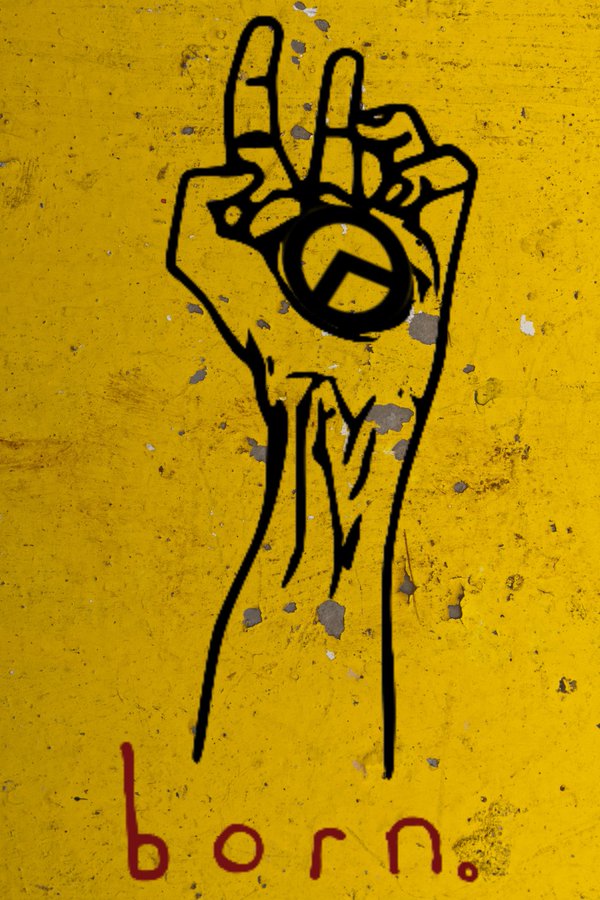
An example of “identitarian” street art in Western Europe.
In regard to our present and future identity our priority must lie today in a precise recognition of the enemy of our identity, as well as our goal to remove the root causes of non- European migrations. In this sense American nationalists, such as they are in their current historical and social context, deserve credit for attributing a lesser role, to say their German, Irish, or Italian heritage, and focus instead more intensely on the imperative to protect and preserve this common bio-cultural heritage. European small-time nationalisms, with a flurry of national identities of sorts, inherited from the 20th century, must no longer play a crucial role in our new identity building process.
When observed from this perspective, today’s Eastern Europe, in contrast to Western Europe, is more “European” in its identitarian character. Yet in terms of the identity building process the situation in Eastern Europe is far from good. All newly emerged states in Eastern Europe display a high dose of obsolete “negative” or “reactive identity.” This can best be observed in Ukraine and Croatia for instance, where a Croatian or Ukrainian nationalist often continues to frame his national identity on his anti-Serbian or anti-Russian sentiments respectively. Such obsolete and often conflict- prone “negative” identities are no longer acceptable in today’s Europe.
We are all aware that today’s eulogies about the multicultural system, as professed by our hostile elites, represent a real threat to all European peoples, be they Poles, Germans, Serbs, Croats, Corsicans, French, etc. Having this in mind, before we start criticizing the threat of “non-European otherness” (i.e. the threat to our identity by non-European migrants) we must first ask ourselves: who benefits mostly from their arrival to Europe? Vociferous complaints among some European and American nationalist about the collapse of America and Europe is not a good starting point to answer this question. One must strongly denounce the criminal acts of radical elements who set fire to migrant homes or vandalize asylum centers in Europe. Our main enemies are not non-European migrants, but our own politicians and their System-friendly intellectuals residing in posh districts and laying the foundations for social discord, without considering the negative impact of their misguided and utopian policies.
The kind of society they are engineering does not have a long life span. I predict that German Chancellor Angela Merkel’s multicultural experiment, along with her “welcoming culture”, is unsustainable and cannot last long. Sooner or later these Frankenstein social projects are bound to disintegrate and end up in a civil disturbance, and in extreme cases, civil war. As witnessed in the artificial state of Yugoslavia, despite all the former academic paeans about the alleged romantic diversity of its former constituent peoples, this composite state made up of different peoples and religions ended in chaos and brutal civil war.

Carl Schmitt
The destructive ideology of multiculturalism, as of recently, has adopted another mendacious, albeit a more flowery name, such as “welcoming culture”, although to be sure, the correct name should be the “culture of self-abolition”, or the “culture of guilt” or the “culture of self-hate.” Today’s much lauded welcoming culture in Germany is merely a liberal verbal substitute for the failed communist project. What communists in Eastern Europe had not achieved by bullets, the present System in Western Europe and in the USA, with its substitute ideology of multiculturalism, is achieving through less violent, albeit more insidious means.
From a historical and philosophical perspective, the ideology of multiculturalism with its is just a belated offshoot of the ideology of hyper-moralism combined with the culture of indigenous European self-hatred and the idol worship on The Other, what Guillaume Faye calls ethnomasochism and xenophilia. There are no signs of self-hatred amidst the peoples of Africa or Asia, and it is impossible to conceive of residents from some African country importing residents from neighboring states into their own state jurisdiction. Oddly, it is only amidst European peoples (or rather, their political and cultural elites) who seem to be tired of politics and ashamed of their history, and where we are observing such suicidal overtures. Carl Schmitt taught us that if a nation tires of politics, this does not mean the end of politics per se, but symbolizes the end of an enfeebled people who are incapable of asserting themselves as a people any longer.
The political roots of this morbid “welcoming culture” (at the core of which is the culture of guilt) are not difficult to trace. The roots of these self-destructive policies are legally embedded in the decades following 1945. It is not difficult to imagine that the policy pursued by German Chancellor Merkel was formulated precisely to exorcise the ghosts of the nightmarish past. As a result, she may find herself compelled to shield herself by pursuing what might be called a destructive extremism going in the opposite direction. The ideology of multiculturalism may have therefore become a model of a kind of “negative identity” that is enforced on all nation states that form part of the progressives’ grand “European project”. Ironically, this project may be equally as destructive to those nations as the hostile and divisive ideologies to which it was a response.
Largely, the ethno-masochistic guilt trips can be traced to a perverted dogma of “Christian equality” and to the concept of the original sin, albeit the sin conceptualized today in its secularized Liberalo-Marxist version. It would be a waste to time trying to disarm the proponents of the welcoming–multi-culture in Europe with arguments based on empirical data. Ideological or religious believes cannot be countered by reeling off empirical facts, as thinkers Gustave Le Bon and Vilfredo Pareto warned. The word “gutmensch“, which has entered popular usage in Germany recently, best describes this self-censoring, neurotic, and hyper-moralistic, multi-culture-prone intellectual, who in many ways resembles a Christian zealot preaching universalized “values” and quasi-spiritual ecumenism in the dying days of Rome. Today’s politicians in Germany, but also elsewhere in the European Union, are engaged in similar process of political self-deception and self-denial when displaying more concern for an idealized figure of the “noble savage” than for a native victim of religiously or ethnically motivated violence, as we have recently seen in the Berlin Christmas market attack and the Vienna New Year’s Eve rapes.

Guillaume Faye
Clearly this so-called “welcoming culture” in Europe – and of course, its underlying ideological basis – is not sustainable. It does not lead to mutual understanding but deepens mutual hatred and xenophobia. We’ve seen on countless historical occasions the failure of forcefully created artificial states and communities. For example, the hostility that exists between various groups of “hyphenated Americans” is more than just anecdotal. Hypothetically, if what multicultural progressives perceive as the greatest evil in the world were to completely disappear – European Man and his civilization – it will by no means halt mutual hatred and wars among those who remain. Neither will it inaugurate a perpetual peace among and between all Men. Racism, exclusion and xenophobia are by no means a characteristic of those who are often characterized as “stale, male and pale” in popular culture, the entertainment industry, the press and mainstream political commentators.
We must remember however that it is not the migrant who is responsible for the decline of Europe and her culture; rather it is our System-politicians, their transnational globalist “superclass” and their borderless and materialistic agendas who are doing most of the harm. If it wasn’t for their work, the problems would not be anywhere as serious or sever as we are experiencing on the Continent. In order to restore our identity as a particular people (a claim of right that is granted to all groups but us under the present regime), we must first dismantle the present ideological consensus and place our ancient cultural values at the top of the political process instead. We all know the greatest political wisdom of all times: whoever makes himself a sheep will soon be devoured by wolves. The biggest challenge that faces us is therefore an internal struggle whereby we muster the courage to defend and promote those things that matter to us the most: our history, our heritage and the promise of our future.
What I hope to have put to the reader is that this defence of our people will necessarily require that identitarians (at least in mainland Europe) must stop investing in internal disputes that serve no good collective interest while we are besieged from all sides. This may be ironic, but it is inconceivable to see how we can reclaim our civilization without making a tactical shift of this type to some significant degree. Furthermore, if our identity is to be protected as a people, we must reject, in principle and outright, all social pathologies that undermine and attack us on every level. This is as much a cultural and aesthetic issue as it is political. And of course, lastly, we must remember that what we suffer today are ultimately derived from our own internal problems – blaming external factors or pawn used to weaken us is ultimately a distraction. A confident and spiritually healthy people is never easy to subdue. So ladies and gentlemen, let us stop being sheep. The fight goes on!
– Tomislav Sunić is a Croatian-American writer, translator and academic who taught at the Anglo-American College in Prague. Between 1993 and 2001, Dr. Sunić served in the Croatian diplomatic corps in Zagreb, London, Copenhagen and Brussels. He received his doctorate in political science from the University of California, Santa Barbara and is one of the exponents of the Nouvelle Droite movement in Europe. Among his various publications, which have appeared in Le Monde, Frankfurter Allgemeine Zeitung, Washington Times, and the New York Times, he is also the author of Homo Americanus – Child of the Postmodern Age (2007) and Postmortem Report: Cultural Examinations from Postmodernity (2010).
Citation Style:
This article is to be cited according to the following convention:
Tomislav Sunić, “European or Ethnic Identity?” SydneyTrads – Weblog of the Sydney Traditionalist Forum (11 February 2017) <sydneytrads.com/2017/02/11/2017-symposium-tomislav-sunic/> (accessed [date]).
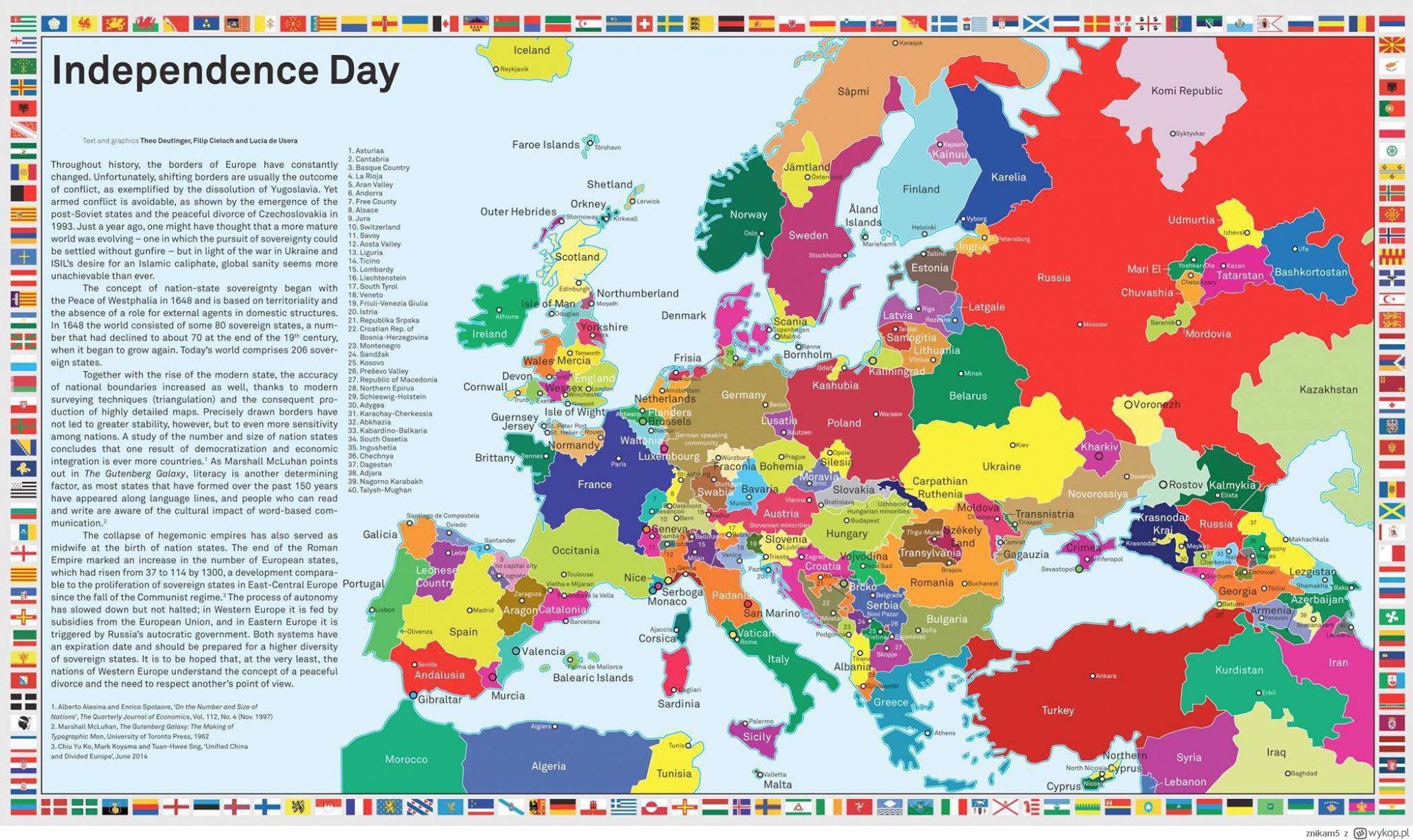
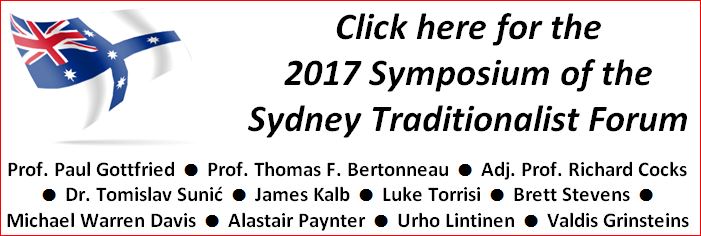
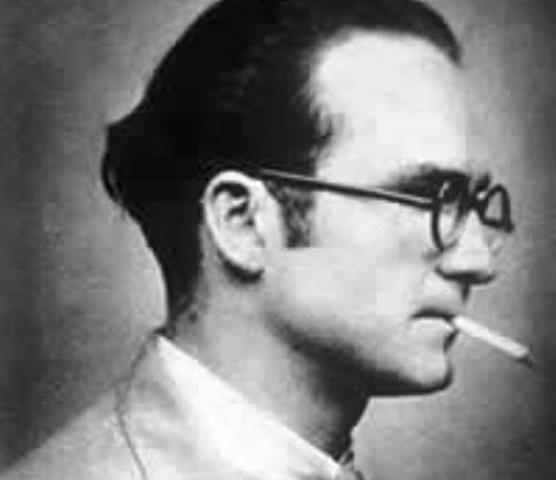
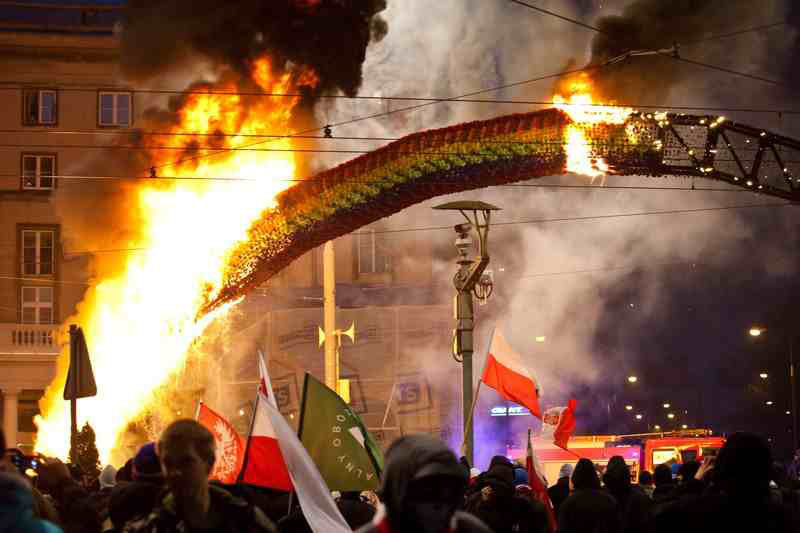


Leave a comment